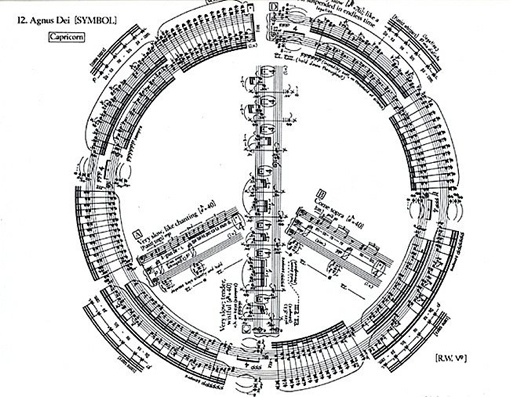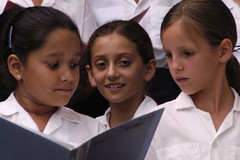Here is a sampling of articles I've been sharing over the past week. You can get an rss feed of all the articles I find here.
| While the Orchestra of the Age of Enlightenment will analyse pieces of music to make them more accessible ahead of their performance, the Philharmonia ... See all stories on this topic » |
The Guardian |
Image Credit- Roger Bourland music blog. Alex Ross on Modern Classical Music I’ve been wanting to write about this article by Alex Ross, published in the UK Guardian in November 2010, for some time now. Ross introduces some of the ideas from his new book, Listen to This, which is sure to garner as much attention as his first wildly popular book, The Rest is Noise. Articles on classical music’s troubles appear daily in various news publications, so why is this book such a breath of fresh air? Three reasons: I’d like to share a story from my own musical history, which relates to the views of Alex Ross. Believe it or not, my first exposure to Brahms symphonic music was in High School. Although I had started clarinet at age 12, and had played a few simple solos from Brahms clarinet sonatas, I had not heard or played any of his symphonies. Then, while attending the Interlochen Summer Music Camp, I was in an orchestra which played Brahms 4th symphony in E Minor, Op. 98. I was blown away by how “modern” Brahms sounded. I had enough musical experience and knowledge to compare his music to other more classical period works up through Beethoven, Tchaikovsky, Liszt and some 20th century works such as Howard Hanson’s very romantic 2nd Symphony. Brahms crams inventiveness into every measure, radically daring harmonies and rhythms tucked into an overall “sensible” romantic style. It seems almost too much to enjoy, at least for a casual, passive listening experience. His music was just challenging enough to my relatively shallow listening sensibilities at the time that he propelled me to seek more and more complex “challenges” of musical puzzles. I agree with Mr. Ross below, that the entire culture of classical music must untangle itself from the tradition of “easy listening”: What must fall away is the notion of classical music as a reliable conduit for consoling beauty – a kind of spa treatment for tired souls. Such an attitude undercuts not only 20th-century composers but also the classics it purports to cherish. Imagine Beethoven’s rage if he had been told that one day his music would be piped into railway stations to calm commuters and drive away delinquents. Listeners who become accustomed to Berg and Ligeti will find new dimensions in Mozart and Beethoven. So, too, will performers. For too long, we have placed the classical masters in a gilded cage. It is time to let them out. Those are hard words to hear for a performing musician who has honed a career perfecting the dusty old classical symphonies. But they are perhaps even more painful words for those who manage orchestras. For they are the ones who must reinvent the business and marketing of orchestral music, selling it to a new audience without alienating the old too much. Would you like to share practice ideas with other musicians? You could do so at the Practice Café. Click here to view the embedded video. American composer and electronic musician Milton Babbitt (May 10, 1916 – January 29, 2011) died today at the age of 94. Babbitt is probably best known for his serial and electronic works, and for his controversial 50′s High Fidelity article, Who Cares If You Listen. In the article, Babbitt offers his perspective on the role of the modern composer: The composer would do himself and his music an immediate and eventual service by total, resolute, and voluntary withdrawal from this public world to one of private performance and electronic media, with its very real possibility of complete elimination of the public and social aspects of musical composition. via Paul Lanksy As a part of a larger international mapping exercise to examine students’ motivation to study music as compared to other school subjects, this article draws upon data from a sample of 3037 students in the USA to observe perceptions of values, competence and interest in music study (in school versus outside of school) among music learners and non-music learners. Students were grouped into three grade levels: (a) 6, (b) 7—9, and (c) 10—12. Music learners in the USA had significantly higher motivational profiles for music and some other school subjects as compared to non-music learners. Music interest inside of school was ranked significantly lower than for any other subject, while music interest outside of school was ranked second highest for any subject in grades 6 and 7—9, and highest of all subjects in grades 10—12. This article addresses cultural and contextual issues in the USA to consider how music advocates might better demonstrate the importance and usefulness of music study as an academic course. Practical recommendations include encouraging a broader emphasis beyond performance and competition, and promoting opportunities for autonomous music learning within the school setting. This study draws on an expectancy-value theoretical framework to examine the motivation (competence beliefs, values and task difficulty) of 24,143 students (11,909 females and 10,066 males, aged 9 to 21 years) from eight countries (Brazil n = 1848; China n = 3049; Finland n = 1654; Hong Kong n = 6179; Israel n = 2257; Korea n = 2671; Mexico n = 3613; USA n = 3072). Music was studied in comparison to five other school subjects (art, mother tongue, physical education, mathematics, science) across three school grade levels that included the key transition from elementary to secondary school. Results indicated that music as a school subject was valued less and received lower task difficulty ratings than other school subjects with the exception of art. Students reported higher competence beliefs for physical education and mother tongue compared to music and lower competence beliefs for mathematics and art. There was an overall decline in students’ competence beliefs and values across the school grade levels for all countries except Brazil. Females reported higher competence beliefs and values and lower task difficulty ratings for music, art and mother tongue than males. Males reported higher competence beliefs and lower task difficulty ratings for physical education and mathematics. There were no gender differences for values in mathematics. Music learners reported higher competence beliefs and values and lower task difficulty across school subjects than non-music learners. Secondary analyses were used to further explore differences within each of the eight countries. Findings suggest that once students have experienced learning to play an instrument or voice, they become more motivated towards other school subjects. Implications of the findings suggest that advocacy aimed at increasing the values that students attach to music as a school subject may encourage more students to become music learners across a wide range of countries.
See all stories on this topic » Read more…
See all stories on this topic » Read more…
Barking up the wrong tree - http://www.bakadesuyo.com/ Read more…
Creativity at Work Blog - http://www.creativityatwork.com/blog/ Read more…
See all stories on this topic » Read more…
See all stories on this topic » Read more…
www.gowerpub.com/default.aspx?page...1... Read more…
Read more…




